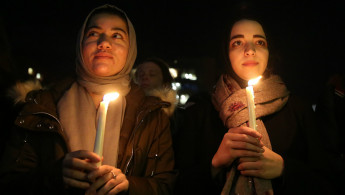America's refugees fear Trump will savage their dreams
A draft executive order published in the Washington Post and the New York Times said refugees from war-torn Syria will be indefinitely banned, while the broader US refugee admissions programme will be suspended for 120 days as officials draw up a list of low risk countries.
Meanwhile, all visa applications from countries deemed a terrorist threat - Iraq, Syria, Iran, Sudan, Libya, Somalia and Yemen - will be halted for 30 days.
Alongside this, the Pentagon will be given 90 days to draw up a plan to set up 'safe zones' in or near Syria where refugees from its civil war can shelter.
Meanwhile, communities across the US are waiting for clarity and bracing for the worst.
In New Jersey, Syrian activist Hamid Imam tells North Jersey how devastating this is for families trying to unite.
"The first thing that comes to mind are the families who are trying to reunify," he said.
 |
He is winning supporters for the short term, but he's losing the country and will lose respect in the whole world - Hamid Imam, Syrian activist |
 |
"You know who just came to my mind? A close friend who is trying to petition for his children. He was accepted as a refugee, and he's trying to petition for his children. Now he can no longer be unified with his children."
His friend, Imam said, arrived in the US two years ago and has since been trying to bring over his wife and five children, who are currently living in a refugee camp in Lebanon.
"With all these executive orders, I think [Trump] is doing this out of emotion to prove to his supporters that 'I'm different and I'm here to change things," Imam said.
"He is winning supporters for the short term, but he's losing the country and will lose respect in the whole world."
In Washington, Marwa Sadik, at the Iraqi Community Center, said new refugees show up every day.
Last year, some 4,000 refugees were resettled in the Washington state. Around one in three had come from a Muslim-majority country, like Iraq, Iran and Somalia.
The suspension of the US refugee programme will close the door on thousands of refugees seeking asylum from religious, political and ethnic persecution.
"There's no way they can do that," she said, "There's no way. There isn't home any more. Iraq or Syria. Both countries are destroyed. There’s no life back there."
 |
It feels more like back home where the president is in charge of everything and they make all the law - Marwa Sadik, the Iraqi Community Center |
 |
Sadik, who is originally from Iraq, said it "Feels more like back home where the president is in charge of everything and they make all the law".
She said similar restrictions were imposed on Muslims refugees following the September 11 attacks. We fought then, she told KUOW, we will fight again.
Meanwhile, the executive director of the Council on American-Islamic Relations' Michigan chapter questioned whether the signed actions would create more security in the US.
"These executive orders will not make our country safer, rather will produce more xenophobia in our society," Dawud Walid said in a statement.
Michigan has one of the US' largest Muslim communities and thousands of Middle Eastern refugees have settled there.
Trump's hard-line attitude towards what he calls "radical Islamic terrorism" was one of the most controversial themes of his election campaign.
 |
Turning our back on vulnerable refugees doesn't protect the United States - Michael Olsen, former director of the US National Counterterrorism Center |
 |
Rights groups have accused him of stigmatising a global faith, and some experts warn that offending America's Muslim allies will hurt the fight against extremism.
"Turning our back on vulnerable refugees doesn't protect the United States," said Michael Olsen, former director of the US National Counterterrorism Center.
"In fact, it plays into [Islamic State's] false narrative that we are at war with all Muslims instead of terrorist organisations," he told watchdog Human Rights First.
Ryan Crocker, former US ambassador to Afghanistan and Iraq, told the group that the executive order would threaten refugees who risked their lives to help US troops.
"Banning the admission of Syrian refugees contradicts American values, undermines American leadership and threatens American security by making the [IS] case that we are at war with Islam," he argued.



